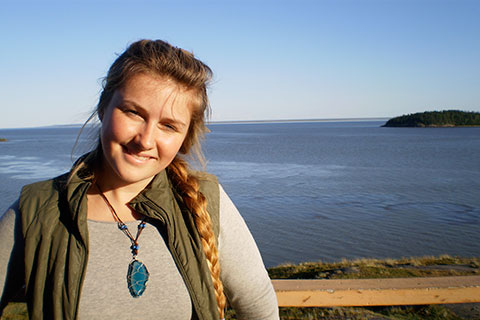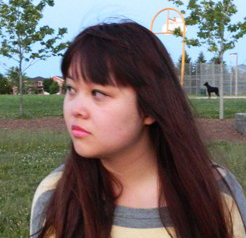Emily Hunter was born into the environmental movement. Her late father, Robert, was the first president of Greenpeace, and her mother, Bobbi, received international attention for saving a whale by using her body to block a harpooner. For the past decade, Hunter has also served on the front lines of environmental activism, from working to stop deforestation in the Borneo rainforest to combating illegal whaling in the Antarctic. Her goal? To inspire this generation’s young people to take responsibility for creating a sustainable world.
At the age of 19, Hunter (BA 2011 UTSC) travelled overseas to Guangzhou, China, to teach English. She witnessed perpetual smog in the atmosphere that looked like a sunset – and “not the nice kind,” she jokes. Hunter realized that, while her father had advocated for saving the world for children and grandchildren, her generation needed to address ecological issues now. “Everyone alive today is living through an ecological tipping point – we are already facing the effects of climate change and environmental degradation,” she says.
Hunter has spoken at several schools across Canada and the United States – from the University of Toronto to Washington State University – to ignite the next generation of eco-warriors. Most are familiar with the green revolution’s past heroes – David Suzuki, Jane Goodall and even Hunter’s father – but “I want to tell the stories of today’s incredible change-makers,” says the 29-year-old activist, who is the author of The Next Eco-Warriors (Conari Press, 2011).
In September 2011, Hunter embarked on a youth-driven campaign to protect orangutans in the Borneo rainforest. She and her team set out to raise awareness about the dangers of monoculture palm oil plantations. Palm oil – which can be found in many consumer products such as cosmetics, cooking oil and cleaning agents – has been a key driver in deforestation. Borneo has one of the most biologically diverse ecosystems, but profitable plantations have “transformed the landscape into a desert of just one or two species,” says Hunter.
After visiting villages in Borneo, Hunter and her team gave talks at schools – both locally and throughout North America – about the destructive palm oil industry. But rapid deforestation continues to plague the region. “To me, the campaign was not a success,” says Hunter. “As a second-generation activist, it was a crude awakening – to realize that the old tactics of flagging banners and just ‘raising awareness’ wasn’t going to work anymore.”
Deeply affected by her lack of impact in Borneo, Hunter began filming young change-makers across the globe for her documentary, Activist 2.0 (due for release on Earth Day 2015). “I want to see what it’s going to take to succeed,” she says. “As activists, we need to evolve and find our own tools to affect change.” She is following the campaigns of Global Power Shift, a network of 500 international climate activists that are holding summits throughout the world, and the Black Fish, an ocean conservation group that is deploying drones into the Mediterranean to monitor illegal driftnets that kill thousands of whales, dolphins and fish every year.
“We need to build collaborative large-scale movements and community projects, or even create new apps that can change the world,” says Hunter, pointing to such social media activism as Earth Hour’s “I Will If You Will” campaign, which encouraged those around the globe to share what they will be willing to do to save the planet – nearly 10,000 challenges were posted on YouTube in 2012, driving 200,000 individuals to accept. “I call it Activism 2.0 – because this generation is revolutionizing activism.”
Hunter, who graduated from U of T Scarborough’s journalism program, wants to use her storytelling skills to bring eco-activism to the forefront. By showing the risks that people are willing to take for a cause, she hopes to inspire others to do the same. “We are the last living generation with the opportunity to make a significant impact within our lifetime,” says Hunter of her fellow 20-somethings. “It’s time to turn things around and make the world a place where we can look forward to tomorrow, rather than a place we’re fearful of.”
Watch a trailer for Activist 2.0 at activist2.com.







No Responses to “ Activism 2.0 ”
While encouraging the younger generation to be active environmentalists around the world is admirable, involving older generations to do the same thing should not be overlooked. Nor should the opportunities at "home " be ignored.
In fact, there are significant opportunities for U of T to save energy. Converting the institution's obsolete lighting will produce deep savings. I will be approaching the U of T administration shortly to assess their level of interest in lighting retrofitting for both the Scarborough and St George campuses.
This is a FYI for you that there are local opportunities that can be promoted by "older" folks like me.